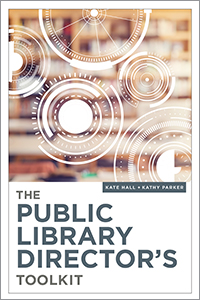Interview: Kate Hall and Kathy Parker on their toolkit for public library directors
"Probably the best thing you can do to set yourself up for success is to create dedicated time during your week to use your organization system," says Kate Hall. "Your days will be busy and carving out time to reflect on what you accomplished and what you still have to do will help you keep on top of everything." Hall and co-author Kathy Parker's new book The Public Library Director's Toolkit is the organizational system/all-in-one resource they wish they'd had when they were new to the role. It covers all the core components of the job and offers up a plethora of templates that will help readers maintain focus. In this interview they share some helpful tips for new library directors, including their favorite organizational tools, and talk about the importance of working together with your team.
You've collaborated on the successful Director’s University program in Illinois, in which you've taught more than 100 library directors. How did you adapt your approach to make it work as a book?
Kate Hall & Kathy Parker: Director’s University was a separate event created two years ago, with the collaboration of the Illinois State Library, regional library systems, Illinois Library Association and a handful of library directors (including both of us) throughout the state. It just happened to  coincide with the writing of our book. It is an intense week of training for new (and new to) Illinois public library directors and covers a variety of topics. We did not structure the book based on DU but did use the feedback from the directors to help us determine which were the most important topics. When we started organizing the book, we had 17 chapters, but soon realized that would be overwhelming and cut it back to the 12 topics that would be the most beneficial for first time director.
coincide with the writing of our book. It is an intense week of training for new (and new to) Illinois public library directors and covers a variety of topics. We did not structure the book based on DU but did use the feedback from the directors to help us determine which were the most important topics. When we started organizing the book, we had 17 chapters, but soon realized that would be overwhelming and cut it back to the 12 topics that would be the most beneficial for first time director.
In your introduction you write, "When we started out as library directors, there was so much we didn’t know. We learned by trial and error, calling on our colleagues, attorneys, and other professionals more times than we could count—because there was no one source to answer all our questions. That is why we are writing this book." What are a few key pieces of advice you’d give someone just stepping into the position?
Kate Hall: I remind people that they don’t have to learn everything at once. Being a public library director is a very cyclical job. You will learn everything, eventually, but don’t feel that you must know everything on day one. Take time to get to know your staff, community, and board. The longer I am a director, the more I realize it is not about what I know, but about how effectively I can get others to work together. And finally, don’t feel that you have to do this on your own. Reach out to other directors near you. I have found that this is a community eager to help others.
Kathy Parker: I think the most important thing to impart to directors at all stages of their career is that is is okay to not know everything, and that it is necessary to ask questions. Being a library director is a hard job. We are entrusted with large sums of (public) money, are responsible for facilities and managing people, often with no formal training in those specific areas. We need to ask questions and utilize the professionals in different fields to do the best job that we can.
Being a public library director is a responsibility with so many moving parts. Can you offer some personal tips for staying organized and making sure nothing falls through the cracks?
Kate Hall: In high school, I used to say, “Organization is the key to success.” Yes, I was that dorky. And I still feel that way, but sometimes it doesn’t matter how organized you are. Stuff will fall through the cracks. If you acknowledge to yourself that you will fail from time to time, it makes it easier when it happens. Before I started at Northbrook [Public Library], I was an email rockstar. I got to inbox zero every day, responded within 24 hours to all my messages; I was amazing. But at Northbrook, I have over 100 staff, a very engaged community, and am on a bunch of committees. I can’t do at Northbrook what I did at my previous jobs. I try to respond within the week, but even sometimes fail in that regard. So while I still consider myself a very organized person, there are areas that I am not as organized about like email. And when I know I am not going to be able to meet people’s expectations, I am clear about I can do.
In terms of general organization tips, I am a big fan of David Allen’s Getting Things Done model and have been using it for years. I have a label maker to make clear labels for my file folders and everything gets put into a file folder. I also use NirvanaHQ to help me keep track of all my projects and  Basecamp for library wide projects. The most difficult part of staying organized as a director is keeping track of the items you are waiting for from other people. NirvanaHQ helps me keep track of all the people that we have working on items and when they need to respond to me by.
Basecamp for library wide projects. The most difficult part of staying organized as a director is keeping track of the items you are waiting for from other people. NirvanaHQ helps me keep track of all the people that we have working on items and when they need to respond to me by.
Kathy Parker: As Kate can attest to, I am not the most organized person. She certainly kept out book writing process on target with her mad organizational skills. As someone who just retired and can look back on what I could have done differently, I wish I had organized better and prepared myself, and for the person who took my place, for success. Find a system that works for you and implement it. It may take a few tries, since there are so many parts to the job, but once you find it, use it. Also, keep in the back of your head that it needs to make sense to other people too. As someone who now is doing interim director work, I can’t tell you how difficult it is to walk into a library where you are going to be for a few months, and can’t find the electronic or paper budget, legal documents or other necessary documents needed to do the work. The system has to work for you but also needs to make sense to others who may come after you.
The whole second part of your book consists of forms and sample documents. Are these resources you created and used yourselves as library directors? How did you decide which ones to include?
Kate Hall & Kathy Parker: These are all documents that we created for use in our libraries, but they are only the tip of the iceberg. When we were deciding what to include in the book, we asked ourselves, “What are the most important documents for someone who has just become a library director.” That informed our decisions on what to include and what not to include. We could have had an entire book of just forms, but we decided that would have been a bit much. Our favorite form is the contract database, which can be downloaded from our website at: https://librarydirectorstoolkit.com/resources/.
What do you think will be the biggest challenges to public library managers over the next five years?
Kate Hall & Kathy Parker: We think it is the same thing we have faced throughout the decades with libraries. How do we remain relevant to our communities while remaining fiscally responsible? To meet this challenge, we need to learn to do more to collect, analyze and use data to make decisions. And then use that information to advocate for our libraries in our communities, states, and at the national level.
Learn more at the ALA Store.
